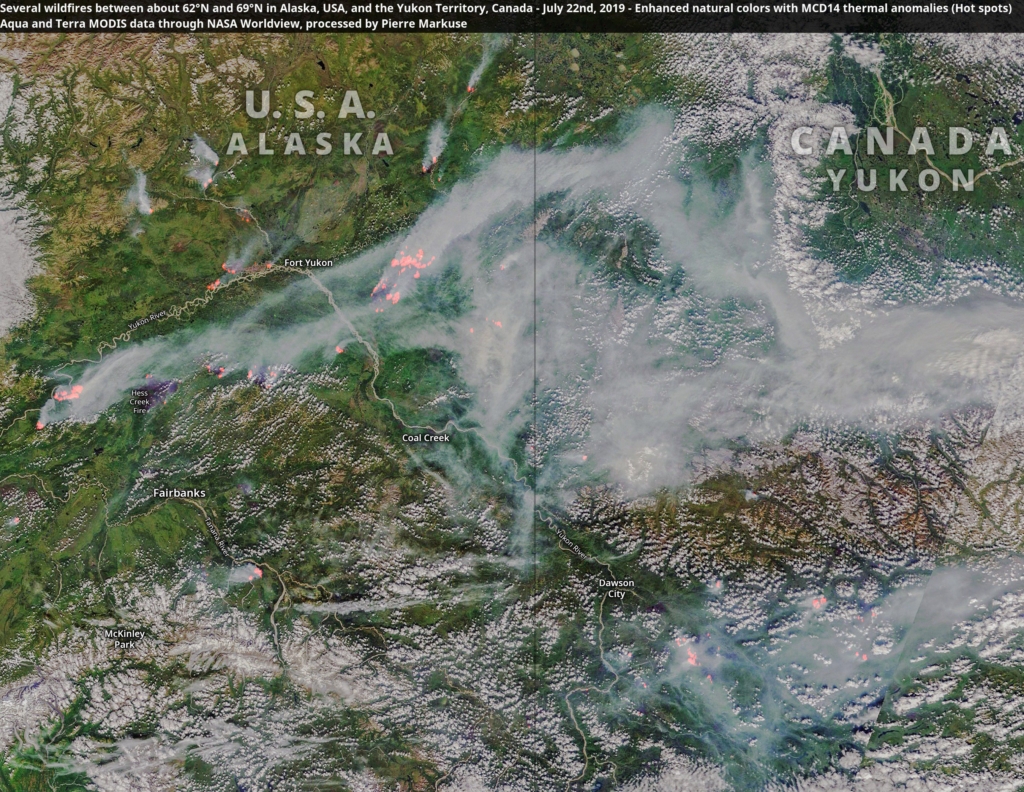6/19 Carbon Release From Arctic Fires Worse Than All June Arctic Fires 2010-18 Combined
EDIT
 Satellite view of several wildfires and smoke between about 62°N and 69°N in Alaska, U.S., and the Yukon Territory, Canada, 22 July 2019. Data: Aqua and Terra MODIS satellite data from NASA Worldview. Photo: NASA Worldview / Pierre Markuse
Satellite view of several wildfires and smoke between about 62°N and 69°N in Alaska, U.S., and the Yukon Territory, Canada, 22 July 2019. Data: Aqua and Terra MODIS satellite data from NASA Worldview. Photo: NASA Worldview / Pierre Markuse
EDIT
Since the start of June, the Copernicus Atmosphere Monitoring Service (CAMS) has tracked over 100 intense and long-lived wildfires in the Arctic Circle. In June alone, these fires emitted 50 megatonnes of carbon dioxide into the atmosphere, which is equivalent to Sweden’s total annual emissions. This is more than was released by Arctic fires in the same month between 2010 and 2018 combined.
Although wildfires are common in the northern hemisphere between May and October, the latitude and intensity of these fires, as well as the length of time that they have been burning for, has been particularly unusual, according to CAMS Senior Scientist and wildfires expert, Mark Parrington.
The ongoing Arctic fires have been most severe in Alaska and Siberia, where some have been large enough to cover almost 100 000 football pitches, or the whole of Lanzarote. In Alberta, Canada, one fire is estimated to have been bigger than 300 000 pitches. In Alaska alone, CAMS has registered almost 400 wildfires this year, with new ones igniting every day. The average June temperature in the parts of Siberia where wildfires are raging, was almost ten degrees higher than the 1981–2010 average.
EDIT
The northern part of the world is warming faster than the planet as a whole. That heat is drying out forests and making them more susceptible to burn. A recent study found Earth’s boreal forests are now burning at a rate unseen in at least 10,000 years. Wildfires also release carbon dioxide into the atmosphere, contributing to global warming. For instance, the 2014 megafires in Canada scorched more than 7 million acres of forest, releasing more than 103 million tonnes of carbon into the atmosphere – half as much as all the plants and trees in Canada typically absorb in an entire year, according to a study by NASA.
EDIT
https://desdemonadespair.net/2019/07/more-than-100-arctic-wildfires-burn-in-worst-ever-season-smoke-plumes-from-huge-blazes-in-greenland-siberia-and-alaska-visible-from-space-these-are-some-of-the-biggest-f.html
